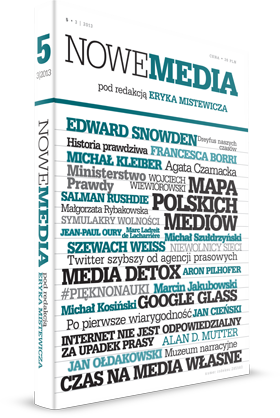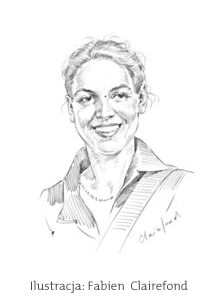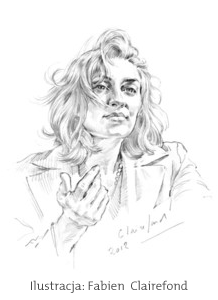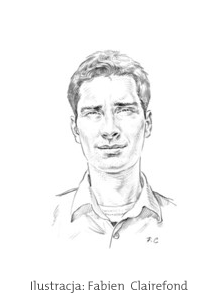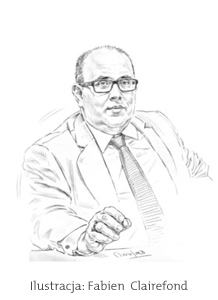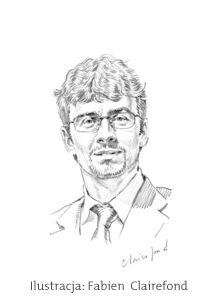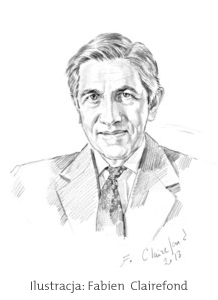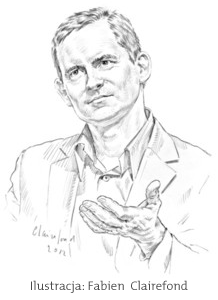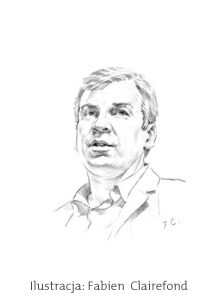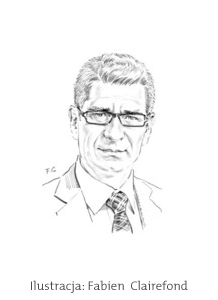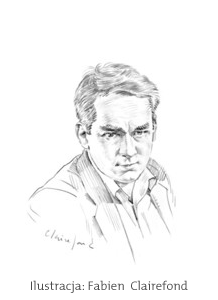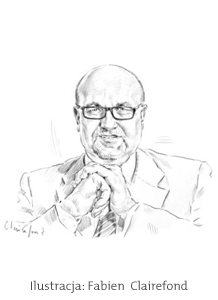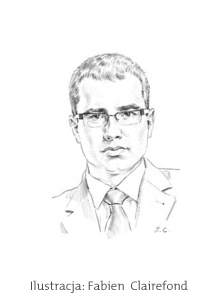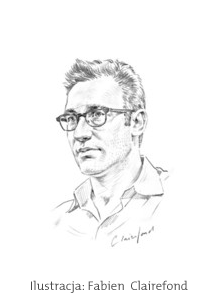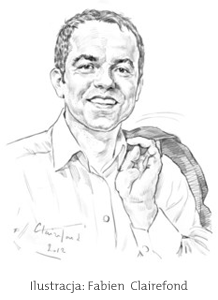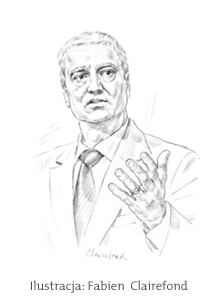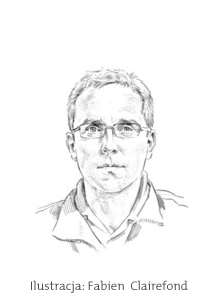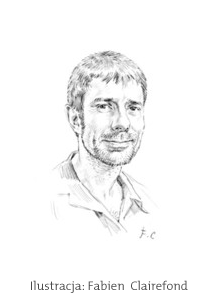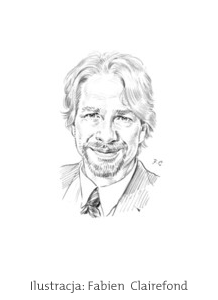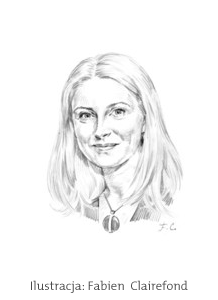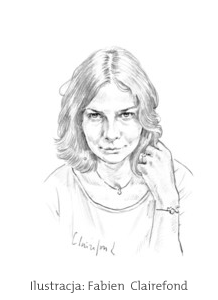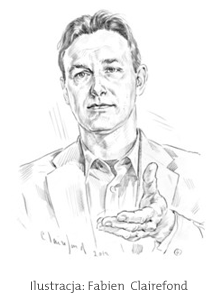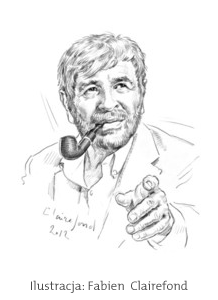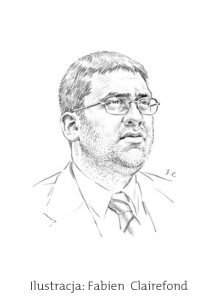Nowe Media nr 5
(5-3/2013)
NOWE MEDIA kwartalnik opinii pod red. Eryka Mistewicza poświęcony skutecznej komunikacji i edukacji, zmianom na rynku mediów, nowym technikom marketingu i Public Relations, procesom selekcji i przyswajania informacji, psychologii poznawczej i wspomagania edukacji w świecie rozproszonej uwagi i natłoku wiadomości.
Najwyższej klasy, renomowani Autorzy porządkują i wskazują trendy i rozwiązania. NOWE MEDIA to pismo referencyjne dla toczących się dyskusji o nowoczesnej edukacji, kreatywności i innowacji, marketingu i PR, dziennikarstwie i mediach społecznościowych. Z założenia nie jest pismem o technologiach, lecz o człowieku. W czasie szybko zachodzących zmian – inspirujące!
NOWE MEDIA ukazują się w wersji papierowej, tradycyjnej, oraz w wersjach cyfrowych.
wydanie papierowewydanie elektroniczne
Spis treści
Francesca Borri | Jean-Paul Oury |
Agata Czarnacka | prof. Michał Kleiber |
Michał Kosiński | Marcin Jakubowski |
Wojciech Rafał Wiewiórowski | S.T. Van Airsdale |
Vačlav Štétka | Chris Brogan |
Pierwsza liga dziennikarstwa MAPA POLSKICH MEDIÓW | Marina Lin |
Alan D. Mutter | Dokument epoki. Media detox |
Piotr Legutko | Małgorzata A. Rybakowska |
Aron Pilhofer | Richard Stallman |
Jan Cieński | Marek Staniszewski |
Marek Kacprzak | prof. Szewach Weiss |
Michał Szułdrzyński | Jan Ołdakowski |
Eryk Mistewicz | Przemysław Przybylski |
Simon Sinek | WARTO PRZECZYTAĆ |
Historia prawdziwa, Francesa BORRI
Włoszka urodzona w 1980 roku. Ukończyła stosunki międzynarodowe, studia z zakresu praw człowieka, a także filozofię prawa. Pracowała jako oficer ds. przestrzegania praw człowieka, publikując w tym czasie książki o tematyce związanej z Kosowem, a także z konfliktem izraelsko-palestyńskim. W stronę dziennikarstwa zwróciła się, gdy zrozumiała, że tych, którzy dzierżą władzę, bardziej porusza jej pióro niż analizy, które wykonywała jako prawniczka. Obecnie jest korespondentką wojenną w Syrii, niniejszy tekst opublikowała w „Columbia Journalism Review”.
Poruszający dokument autorki, która wolała pisać reportaże niż analizy prawne. Dokument czasów, w których praca dziennikarza nie jest wiele warta. Gdy wykonywana jest z pasją, chęcią dojścia do prawdy, wyjaśniania rzeczywistości, spotyka się z pytaniem redakcji: „Co to ma być? Sześć tysięcy znaków i nikt nie zginął…?!” A jednocześnie – pisze Francesca Borri – czytelnicy chcą dziś prostoty, a nie prostactwa. Chcą rozumieć, a nie tylko wiedzieć, co się wydarzyło. Poruszający, warty uważnej lektury tekst.
ABSTRACT: The crisis today is of the media, not of the readership. Readers are still there, and contrary to what many editors believe, they are bright readers who ask for simplicity without simplification. They want to understand, not simply to know. Every time I publish an eyewitness account from the war, I get a dozen emails from people who say, “Okay, great piece, great tableaux, but I want to understand what’s going on in Syria.” And it would so please me to reply that I cannot submit an analysis piece, because the editors would simply spike it and tell me, “Who do you think you are, kid?”– even though I have three degrees, have written two books, and spent 10 years in various wars, first as a human-rights officer and now as a journalist. My youth, for what it’s worth, vanished when bits of brain splattered on me in Bosnia, when I was 23.
RESUME: «Ce sont les médias qui traversent la crise aujourd’hui, et pas les lecteurs. Car les lecteurs sont toujours là, et contrairement à ce que croient de nombreux éditeurs, il s’agit des lecteurs brillants. Ils recherchent la simplicité, pas la grossièreté. Ils veulent comprendre, et pas seulement savoir. Chaque fois que je publie relation oculaire de la zone du combat, je reçois des dizaines de courriels qui disent: «C’est vraiment super ce morceau, mais je veux comprendre ce qui se passe en Syrie.» Je voudrais leur dire que je ne peux pas publier mon analyse parce que l’éditeur va me gronder: «Pour qui tu te prends, petite fille?! »Et même si j’ai complété trois cursus, j’ai écrit deux ouvrages et j’ai passé dix années à observer de diverses guerres, d’abord en tant que militante des droits de l’homme, puis comme journaliste. Ma jeunesse, quoi qu’elle valait, a évaporé au moment où les morceaux du cerveau humain ont eclaboussé mon visage en Bosnie. J’avait 23 ans seulement.»
Edward Snowden. Dreyfus naszych czasów, Agata CZARNACKA
Filozofka, tłumaczka, analityczka polityki. Od marca 2012 r. redaktor naczelna portalu Lewica24.pl. Naukowo – w Instytucie Filozofii UW – bada normalność.
Czy zadziwienie poziomem inwigilacji zapoczątkowane przez aferę Edwarda Snowdena będzie podobnym wstrząsem jak afera Dreyfusa? Czy właśnie jesteśmy świadkiem rodzącej się w bólach świadomości XXI wieku? Czy w najbliższych dekadach walka z bezwzględną kontrolą stanie się wyznacznikiem wielkiej polityki? Czy będziemy potrafili utworzyć jakiś „internetowy ONZ”, który walczyłby z inwigilacją, jak Narody Zjednoczone walczyły o humanitaryzm? Bardzo ważne pytania. Inspirujący, ważny tekst!
ABSTRACT: Will the astonishment at the level of surveillance with the Snowden affair be a similar shock to the Dreyfus affair? Are we now bearing witness to the painful birth of 21st century consciousness? Is the fight with relentless control going to become the indicator of great politics in the decades to come? Will we be able to create some kind of an “Internet United Nations” that would fight surveillance the way United Nations fought for humanitarianism? The scandal around PRISM shows that the world and society have changed, just like the Dreyfus affair has brought to light the changes in European societies, then only recently defined as national.
RESUME: La stupéfaction initiée par l’affaire Snowden sera-t-elle un choc comparable à l’affaire Dreyfus? Assistons-nous à une prise de conscience émergente de la douleur de la XXIe siècle? La lutte contre un contrôle absolu deviendra-t-elle un facteur déterminant de la politique au cours des prochaines décennies? Serons-nous capables de créer une espèce d’Internet onusien qui lutterait contre la surveillance de maniere que les Nations Unies font de l’humanitaire? Le scandale autour du PRISM montre que le monde et les sociétés ont changé tout comme l’affaire Dreyfus a mis au jour les vulnérabilités au sein des sociétés européennes qui n’ont fait que commencer à se définir comme nations à l’époque.
Big data – wyzwanie czasu, Michał KOSIŃSKI
Prowadzi centrum psychometryczne na Uniwersytecie w Cambridge oraz jest doradcą naukowym w Microsoft Research. Prowadzi badania na pograniczu psychologii, big data i Internetu. Jego najnowszy projekt badawczy prowadzony na próbie ponad 6 milionów respondentów doprowadził do dziesiątków publikacji naukowych i powstania kilku komercyjnych produktów.
Polak prowadzący Centrum Psychometryczne na Uniwersytecie Cambridge to dziś jeden z najbardziej wpływowych badaczy świata nowych mediów. Jego zespół analizuje, jakie informacje pozostawiamy w sieci, jak można je wykorzystać do tworzenia profili konsumenckich i wyborczych, jak przewidzieć zachowania użytkowników Internetu. Zwraca uwagę na konieczność wypracowania standardów w zapewnieniu pełnej kontroli nad gromadzeniem i udostępnianiem innym swoich danych.
ABSTRACT: Operations Director of the University of Cambridge – The Psychometrics Centre presents some research from the borderland of psychology, Big Data and the Internet. He points to the fact that the users should have full control over the collection of data and sharing those data with others. Today it is the standard that our data are kept and processed by various institutions and companies, often without us being aware of that. From the point of view of technology, however, there is no obstacle to the data (like money) being stored by independent data banks, on private discs or personal accounts in the cloud. Facebook does not have to know the lists of likes and friends of its users, it is enough that the computers of the users have them. Amazon does not have to keep track of my transactions: the transaction register can be kept in an independent data bank – and it does not have to have access of to the clients’ addresses, which can be passed on straight to the messenger service. Full control of the user over his or her data does not imply worse product or service.
RESUME: Directeur des opérations au Centre Psychométrie de l’Université de Cambridge présente des recherches à la frontière de la psychologie, Big Data et Internet. Il attire l’attention sur la nécessité de donner aux utilisateurs un contrôle absolu sur la collecte et le partage des données. Aujourd’hui la norme est que nos données sont stockées et traitées par des institutions et des entreprises souvent à notre insu. En termes de technologie rien ne s’oppose à ce que ces données soient stockées (comme l’argent) par des banques de données indépendantes, sur les disques privées ou sur les comptes personnels dans le nuage. Facebook n’a pas besoin de connaître la liste des «j’aime» et les amis de ses utilisateurs; il suffit que ces données soient disponibles à partir des ordinateurs des utilisateurs. Amazon n’a pas besoin de tracer nos transactions – celles-ci peuvent être repertoriées dans une base de données indépendante – et ne doit pas avoir accès aux adresses des clients puisqu’elles peuvent être transmises directement à la société de courrier. Un contrôle absolu des utilisateurs sur leurs données ne signifie pas forcément que la qualité des produits et des services sera mauvaise.
Ministerstwo prawdy vs prawo do bycia zapomnianym, Wojciech Rafał WIEWIÓRKOWSKI
Główny inspektor ochrony danych osobowych, doktor nauk prawnych. Naukowo zajmuje się polskim i europejskim prawem nowych technologii, przetwarzaniem i bezpieczeństwem informacji, rolą systemów informacji prawnej, informatyzacją administracji publicznej, podpisem elektronicznym oraz zastosowaniem sieci semantycznej i ontologii prawniczych w porządkowaniu informacji prawnej. Absolwent Wydziału Prawa i Administracji Uniwersytetu Gdańskiego, gdzie kierował pracownią informatyki prawniczej.
Spór wokół prawa do bycia zapomnianym, do własnoręcznego kształtowania opowieści o sobie w sieci, to jeden z najciekawszych sporów w świecie nowych mediów. Artyści, naukowcy, sportowcy, politycy i dziennikarze, chcąc kształtować swój wizerunek, szukają rzeczników ochrony prywatności. Poprosiłem ministra Wojciecha Wiewiórowskiego, Generalnego Inspektora Ochrony Danych Osobowych o jego analizę coraz bardziej nabrzmiewającego problemu.
ABSTRACT: Minister Wojciech Wiewiórowski, the General Inspector of Personal Data Protection, describes the contention around the right to be forgotten, to the right to shape your story in the net on your own – one of the most interesting issues in the world of new media. The problem of the right to be forgotten grows today on global scale, however it is solved differently in different legal cultures: what remains within the freedom of speech in the United States may be hate talk in Europe. Artists, scientists, sportsmen, politicians and journalists willing to shape their image seek spokesmen for privacy protection, in Poland more and more often also in state institutions.
RESUME: Ministre Wojciech Wiewiórowski, l’Inspecteur général à la Protection des Données personnelles, décrit un différend sur le droit à l’oubli, à la création de son image sur l’Internet – l’un des différend les plus intéressants dans le monde des nouveaux médias. Le problème relatif au droit à l’oubli prend de l’ampleur aujourd’hui à l’échelle mondiale, mais il est résolu différemment selon les cultures juridiques: ce qui passe pour la liberté d’expression aux États-Unis peut risque d’être qualifié de discours de haine en Europe. Artistes, scientifiques, athlètes, politiciens et journalistes désireux de façonner son image sont à la recherche des défenseurs de la vie privée; en Pologne de plus en plus aussi dans les institutions publiques.
Gdy rodzimy biznes inwestuje w media, Václav ŠTÉTKA
Starszy analityk Wydziału Nauk Politycznych i Stosunków Międzynarodowych Uniwersytetu Oksfordzkiego. Prowadzi badania z zakresu własności na rynku mediów oraz struktur rynku w ramach projektu „Media i demokracja w Europie środkowej i wschodniej”. Raport z badań opublikowano w Visegrad Iinsight nr 3, półroczniku Res Publiki Nowej.
Obserwujemy nową fazę w rozwoju systemu medialnego Europy Środkowo-Wschodniej, skąd wycofują się powoli zachodni gracze, a pierwsze skrzypce zaczynają odgrywać lokalne elity. Media w Europie Środkowo-Wschodniej coraz częściej stają się narzędziem do realizowania celów osobistych – biznesowych i politycznych – przedsiębiorców. Kryzys tak ekonomiczny, jak i kryzys dziennikarstwa dają o sobie tym silniej znać. Arcyinteresująca, powstała na Uniwersytecie Oksfordzkim, analiza zmiany dokonującej się w mediach naszej części Europy.
ABSTRACT: The system of media in Central and Eastern Europe went into the new phase of the improvement and we are currently the witnesses. In this new phase, local owners – and mostly local business – related elites are playing very important roles. Western players are leaving their fields. Media in Central and Eastern Europe nowadays more often become a tool for the personal goals of businessmen. Economical crisis, together with the crisis in journalism have shown their effects. Very interesting analysis of our part of the Europe, strightly from the Oxford University.
RESUME: Une nouvelle étape est en train de se produire dans le processus du développement du système médiatique en Europe centrale et orientale. Les propriétaires locaux, en particulier les élites locales d’affaires, jouent un rôle de plus en plus important. Des joueurs occidentaux se retirent peu à peu. Les médias en Europe centrale et orientale deviennent un moyen permettant aux entrepreneurs de poursuivre des objectifs personnelles. La crise économique et celle du journalisme se font sentir. Une analyse fort intéressant, provenant de l’Université d’Oxford, des médias dans notre partie de l’Europe.
Pierwsza liga dziennikarstwa MAPA POLSKICH MEDIÓW
ABSTRACT: The first Polish map of media presents the most influential representatives of the trade. It is a special “photo” of influence. Also, a useful tool for observing changes in the world of the Polish media. On the horizontal line we have marked the weltanschaung position of the best known Polish journalist, in a somewhat anachronistic – in the times of post-politics – division into left and right, and the vertical line is elitism vs egalitarianism of their work; often it is an outcome of a planned and realized image. The map shows that there aren’t, and never have been, neutral media, uninvolved journalists staying “in the middle”.
Dziennikarstwo to zaufanie. Niewiele więcej, Alan D. MUTTER
Jeden z najbardziej znanych amerykańskich strategów medialnych. Pracował m.in. dla New York Times CO., Associated Press, Los Angeles Times, Sun-Times Media Group, Fox Network Affiliates, The Evening Post Publishing CO., Schurz Communications, Bakersfield Californian, Inland Press Association, Universal Uclick, American Alliance of Business Publications, Texas Pacific Group, Basf i Kyocera. Tworzył innowacyjne startupy Silicon Valley, pionierów reklamy klasyfikowanej, technologii e-handlu i systemów zarządzania prawami autorskimi w sieci. Naucza ekonomii mediów na Uniwersytecie Kalifornijskim w Berkeley i pisze o zmiennym krajobrazie mediów w cyklu „Reflections of a Newsosaur”.
Bądźcie lokalni, a nie globalni. Piszcie o ludziach, a nie o procesach. Patrzcie w przód, a nie wstecz. Pokazujcie zamiast opowiadać. Dyskutujcie zamiast dominować. Podkreślajcie różnorodność – nie bądźcie zaściankowi. Alan D. Mutter, jeden z najbardziej znanych amerykańskich strategów medialnych przedstawia swoją receptę na obniżający się lot prasy i dziennikarstwa, nie tylko w Stanach Zjednoczonych.
ABSTRACT: Be local, not global. Write about people, not processes. Look ahead and not back. Show instead of telling. Discuss instead of dominating. Emphasise diversity – instead of thinking backwater. Alan D. Mutter, one of the best known American medial strategists, presents his remedy for the lowering standards of newspapers and journalism, not only in the States.
RESUME: Soyez local, pas global. Ecrivez sur les gens, et non sur les processus. Regardez en avant, pas en arrière. Montrez au lieu de raconter. Discutez plutôt que dominez. Mettez l’accent sur la diversité, ne soyez pas paroissiaux. Alan D. Mutter, l’un des plus fameux stratèges médias américains présente son remède contre un vol descendant de la presse et du journalisme, pas seulement aux États-Unis.
Rządzić zaczyna szanowny pan czytelnik, Piotr LEGUTKO
Dziennikarz, publicysta, pedagog. Debiutował w „Tygodniku Powszechnym”. Od 1991 do 1997 r. w „Czasie Krakowskim”, także jako redaktor naczelny. Szef publicystyki TVP 1, zastępca dyrektora Agencji Informacji TVP. Od 2007 do 2011 r. redaktor naczelny „Dziennika Polskiego”, obecnie pracuje w „Gościu Niedzielnym”. Współautor (z Dobrosławem Rodziewiczem) „Gry w media” i „Mitów IV władzy”, autor „Sztuki debaty”, „Jadu medialnego”, „Kodu buntu”, „Dlaczego zawiedliśmy?”. Wiceprezes Stowarzyszenia Dziennikarzy Polskich.
ABSTRACT: A moment of quiet reflection should tell us that even if we think nothing of journalism and are interested only in the effectiveness of our own company, we should feel into the needs of our clients. And he will not pay for rubbish – he is being inundated with rubbish, from all sides, for free. To focus on the “optimal models of content recycling” means falling into autarky. Eating your own tail has no future. It is time to catch up with the client, finally. Focusing on the needs of the readers, not politicians or advertisers is the last resource for us, journalists. The Copernican breakthrough proposed by Patrick de Saint-Exupéry and Laurent Baccaria is happening in Poland right now.
RESUME: Un moment de réflexion silencieuse devrait nous faire comprendre que même si l’on se fiche du journalisme et qu’on est préoccupé principalement de l’efficacité de son entreprise, on doit faire preuve d’empathie vis-à-vis des besoins du client. Et lui, il ne paiera pas des bêtises dont il est innondé gratuitement de tous les côtés. Se concentrer sur le «modèle optimal de recyclage du contenu», c’est se plonger dans l’autarcie. Manger sa propre queue, ça n’a pas d’avenir. Le temps est venu d’apprécier le client, de se concentrer sur les besoins des lecteurs, et non ceux des politiciens ou des annonceurs. C’est pour nous, les journalistes, notre dernier recours. La révolution copernicienne proposée par Patrick de Saint-Exupéry et Laurent Baccaria est en train de se produire en Pologne.
Dziennikarstwo nie zatonie, ono się zmieni, Aron PILHOFER
Szef działu Nowych Mediów w „The New York Times”. Do tytułu dołączył w 2005 roku. Jest także współzałożycielem serwisów Documentcloud.org oraz Hacks & Hacker.
„Może zabrzmi to nieprawdopodobnie, ale właśnie się zaczął jeden z najlepszych momentów w historii dla dziennikarstwa” mówi szef działu nowych mediów „The New York Timesa”. Nie narzeka. Jest przygotowany na to, że dziennikarstwo, media, prasa, będą jeszcze schodziły w dół, wciąż szukając nowych, lepszych rozwiązań, coraz bardziej skutecznych, efektywnych technik komunikacji z odbiorcami. Dokładnie tak!
ABSTRACT: „A journalist in the era of new media must not only be inventive and open to new solutions, but also enterprising. He must experiment, seek new solutions and ways of communicating with his readers: he must not be afraid of working on tablets or smartphones. Besides, he must understand the business side of journalism. And first of all: he must know something about everything and everything about something. He must be a specialist in a specific field.”
RESUME: «Le journaliste de l’ère des nouveaux médias ne doit pas seulement être créatif et ouvert à de nouvelles solutions, mais aussi entreprenant. Il doit expérimenter, chercher de nouvelles solutions et les moyens de se communiquer avec ses lecteurs: il ne peut pas avoir peur de travailler sur les tablettes et les smartphones. En plus, il doit comprendre l’aspect commercial du journalisme. Et l’essentiel est qu’il sache quelque chose à propos de tout et tout à propos de quelque chose. Il est obligé d’être spécialiste dans un domaine particulier.»
Wiarygodność medium albo jego śmierć, Jan CIEŃSKI
Warszawski korespondent „Financial Times”. Szef warszawskiego biura „Financial Times”. W 1989 i 1990 r. pracował w Warszawie dla United Press International. Od 2003 r. analizuje i relacjonuje najważniejsze wydarzenia w Polsce dla „Financial Times”. Wcześniej pracował w Waszyngtonie dla National Post i The Associated Press. Od 1992 do 1995 r. pracował dla niemieckiej agencji DPA w Moskwie, a także w Taszkiencie i Uzbekistanie. Pochodzi z RPA, absolwent stosunków międzynarodowych na Uniwersytecie w Toronto.
Poprosiłem warszawskiego korespondenta „Financial Times” o odpowiedź na pytanie, co jest dziś najważniejsze w mediach. Nie wahał się: WIARYGODNOŚĆ. To magiczne słowo konstytuuje przyszłość mediów i – moim zdaniem – także media przyszłości. Bez wiarygodności nie ma zaufania czytelników, nie ma szacunku dziennikarzy do swojej pracy, nie ma poważania u odbiorców. Opowieść Jana Cieńskiego o tym przypomina.
ABSTRACT: The credibility is today the most important vawe for media. The Warsow correspondent of «Financial Times» writes aobut the «Chinese Wall» which seperates the business part and editorial part of the redaction he works for. Also, about searching the balance which needs to be kept by the newspapers and magazines to avoid the fall of credibility. This is a very hard fight today, especialy for the smaller tittles.
RESUME: La crédibilité est aujourd’hui la plus grande valeur des médias. Le correspondant du «Financial Times» à Varsovie écrit sur la «muraille de Chine» séparant la partie éditoriale et celle d’affaires de son journal, ainsi que sur la recherche de l’équilibre que les journaux et les magazines doivent maintenir afin de ne pas perdre leur crédibilité aux yeux des lecteurs. Il s’agit, surtout pour les petits titres, d’une lutte fort difficile pour la survie.
Dlaczego upada telewizja?, Marek KACPRZAK
W Polsat News, gdzie pracuje, prowadzi „Wydarzenia Opinie Komentarze”. Wcześniej dziennikarz m.in. TVN24, TVP, RMF FM, Polska The Times. Naukowo zajmuje się ekonomiką kultury, w szczególności zarządzaniem w mediach i ekonomiką mediów.
ABSTRACT: Television experiences the same problems which ten years ago started devastating the press market. Informational TV stations are under-invested, they take the easy route, they switch on the signal from the parliament in order to cut down on the expenses, they create their own criminal and moral issues with which they can attack spectators for several days in a row, they consciously give up on spectators of more refined needs. The informational TV stations have no money, and having no money, they count on mass audience with little aspirations.
RESUME: La télévision éprouve aujourd’hui les problèmes qui ont commencé à devaster le marché de la presse il y a dix ans. Les chaînes d’information sont sous-financées, elles choisissent des solutions faciles, transmettent les séances du parlement afin de réduire les dépenses, créent leurs propres histoires de crime et de mœurs pour épater le public avec celles-ci pendant quelques jours, et rénoncent consciemment aux téléspectateurs ayant les goûts plus sophistiqués. Les chaînes d’information manquent de l’argent, et faute d’argent, elles misent sur une audience de masse avec peu d’aspirations.
Telewizja z przesłaniem, Michał SZUŁDRZYŃSKI
Dziennikarz i publicysta, absolwent studiów doktoranckich z filozofii na Uniwersytecie Jagiellońskim. Kieruje działem Krajowym dziennika „Rzeczpospolita”. Prowadził programy publicystyczne w TVP Info i Polsat News.
Fenomen, który umyka zobiektywizowanej ocenie. Fenomen wymagający solidnych badań naukowych, bez ideologicznego zacietrzewienia. Fenomen, wobec którego nie sposób przejść obok: kiełkowania, budowania, tworzenia się tożsamościowych stacji telewizyjnych. Michał Szułdrzyński analizuje fenomen TV Republika i TV Trwam i wyprowadza wnioski ważne także dla świata nowych mediów.
ABSTRACT: Conservative ideals sometimes prove close to as many as over a half of the Poles – if you analyse the style of living etc.. If you look at the results achieved in elections and opinion polls by the parties situated on the right side of the political scene, you could think that Poland should become a real Eldorado for the media which are very clear, identity based, of a more rightist character. But if you start looking at the TV market, both the rightist stations have unproportionally small audiences compared with political and life-style sympathies of a large group of the Polish people. This, however, is beginning to change together with the emergence of TV Republika and the digital broadcast licence given to TV Trwam.
RESUME: Les idéaux conservateurs sont parfois proches à plus de la moitié des Polonais, notamment lorsque l’on analyse les questions de mœurs. En regardant les résultats des élections ou des sondages d’opinion réalisés par les parties qui se situent sur le côté droit de l’échiquier politique, il semble que la Pologne devrait devenir un paradis pour les médias d’une identité expressive, à caractère plus à droite. Mais quand l’on porte le regard sur le marché de la télévision, les deux chaînes de droite ont une audience disproportionnellement faible par rapport aux sympathies politiques et morales d’un grand nombre de Polonais. Cela, cependant, commence à changer avec la création de TV Republika et l’octroi de licence de diffusion numérique pour TV Trwam.
Czas na media własne, Eryk MISTEWICZ
Konsultant strategii marketingowych. Współautor „Anatomii władzy” (2010), autor „Marketingu narracyjnego” (2011). Laureat polskiego Pulitzera, Nagrody Głównej Stowarzyszenia Dziennikarzy Polskich (1995). Promotor narzędzi komunikacji masowej 2.0. Pracuje jako doradca instytucji, firm i osób publicznych.
„Gdzie mam zapłacić, aby moje zdanie zostało usłyszane? Dotychczas kierowałam pieniądze na reklamę w N., w G., w P., dostawałam w pakiecie rozmowę z prezesem i teksty o branży, takie jak sobie wymarzyłam. A teraz, gdy wszystko pada, gdzie i u kogo mam kupić zdolność komunikacji mojej firmy z otoczeniem, że powiem górnolotnie?” – pyta szefowa komunikacji korporacyjnej dużej firmy. Pyta zasadnie.
ABSTRACT: Creating personal media (your own distribution channels, e.g basing on Twitter), company media (to generate stories concerning the branch in which the company functions), government media (your own informational and publishing portals, with first places in the net for the neighbours) on one side deepens the problems of the hitherto journalism, on the other – opens the way for efficient communication of one’s own business. If traditional media are not capable of meeting the needs of companies, institutions, offices, if their power is getting lost, fragmented, if they lose their credibility and position among their audience, readers, listeners, spectators, then companies, institutions, offices have no other way out. The power of electronic narration yoked together with an institution’s or company’s own channels of broadcast are slowly becoming an inevitable element of efficient communication strategy.
RESUME: La création des médias personnels (nos propres canaux de diffusion d’information tels sur Twitter), des médias professionnels (pour raconter des histoires sur l’industrie dans laquelle l’entreprise œuvre), les médias officiels (portails d’information et d’opinion) d’une part aggrave les problèmes existants du journalisme, et d’autre part ouvre la voie vers une communication efficace de nos propres intérêts. Si les médias traditionnels ne sont pas en mesure de répondre aux besoins des entreprises et des institutions, si leur puissance est gaspillée, s’ils perdent leur crédibilité vis-à-vis des clients, lecteurs, auditeurs, téléspectateurs, alors les entreprises et les institutions n’ont pas d’autre choix. La force du réctit numérique, couplé avec les canaux propres de diffusion l’information d’une entreprise ou d’une institution, devient peu à peu un élément essentiel d’une stratégie de communication efficace.
@chopinairport, Przemysław PRZYBYLSKI
Coraz częściej pojawiają się pytania o to, jak skutecznie wykorzystywać Twitter w działalności firm. Wydawałoby się, że to jedynie kilka zasad, które należy pojąć, zrozumieć, respektować. Jednak najczęściej polskie firmy nie radzą sobie z tym narzędziem. Jest wyjątek: port lotniczy Okęcie – najlepszy brand komercyjny działający w polskiej przestrzeni Twittera. I najlepsze consumer care w nowych mediach w Polsce.
ABSTRACT: Warsaw Airport is the best company Twitter profile in Poland. The number of the followers exceeds 29 000. Presently, it occupies the ninth position among all the airports present on Twitter (and according to the consulting company Solterbeck.net there are over 500 of them now). The Chopin Airport belongs also to the most active – among airports – service users. Both as concerns the number of the published tweets, and the interaction with other users, they are among the few world champions. The Klout indicator, showing the power of impact in social media is 69, which is the eighth position among airports. The airport has built via Twitter a community of the size seldom achieved by other brands in Poland.
RESUME: L’aéroport de Varsovie a le meilleur profil de l’entreprise en Pologne sur Twitter avec plus de 29000 fidèles. Il s’agit du neuvième résultat parmi tous les aéroports présents sur Twitter (selon le cabinet de conseil Solterbeck.net il y en a déjà plus de 500). L’aéroport Chopin est aussi – par rapport aux autres aéroports – l’un des plus actifs utilisateurs de Twitter. Il est dans le peloton de tête tant en termes de nombre de tweets publiés que d’interactions avec les autres utilisateurs. Son Klout score – l’indicateur qui mesure l’influence des médias sociaux – de 69 lui donne le huième place parmi les aéroports. L’aéroport Chopin s’est créé une communauté Twitter que d’autres marques en Pologne ont souvent échoué à se constituer.
Zaczynaj od dlaczego, Simon SINEK
Guru inspiracji w świecie nowych mediów. Współpracuje z Rand Corp., wykłada komunikację strategiczną na Uniwersytecie Columbia. Autor koncepcji Why i światowego bestselleru „Zaczynaj od dlaczego. Jak wielcy liderzy inspirują innych do działania” (wyd. Polskie wyd. Helion, 2013). Jego wykład dla Ted.com jest jednym z dwudziestu najczęściej oglądanych w tym serwisie.
Cenię szaleńców, filozofów, artystów, twórców nowych koncepcji, autorów projektów, którzy całe swe profesjonalne życie poświęcają jednej idei. Dla Simona Sineka jest to „Why?”. Jeśli od pytania „Dlaczego?” zaczniemy, wówczas wszystko będzie na swoim miejscu, wówczas zwielokrotnimy naszą szansę na sukces. Podporządkowanie projektów innym pytaniom wydłuży naszą drogę, a często sprowadzi nas na manowce. Inspirujące dla świata nowych mediów, bardzo!
ABSTRACT: Leadership requires two things: a vision of a non-existing world and the ability to communicate that vision. The question is: where can you take the vision from? And here manifests the power of our WHY. Our vision is a world that we imagine, which has a chance to exist if we devote every day to the realization of our WHY. Leaders do not have monopoly for great ideas; first of all they give support to those who want to join them. They cannot do a lot on their own but they can inspire others to act for the bebefit of the group. True leaders never start from pointing to what should be done. They first say WHY it should be done. They inspire to action.
RESUME: Le leadership exige deux choses: une vision du monde qui n’existe pas et la capacité de communiquer cette vision. La question est de savoir où trouver une telle vision. Et cela révèle la puissance de notre POURQUOI. Notre vision est un monde que nous nous imaginons et qui est susceptible de naître si nous consacrons chaque jour à la réalisation de notre POURQUOI. Les leaders n’ont pas le monopole des bonnes idées; ils prêtent avant tout leur soutien à ceux qui veulent se joindre à eux. Ils ne peuvent guère agir eux-mêmes, mais ils peuvent inspirer les autres à agir au bénéfice du groupe. Les vrais leaders ne commencent jamais par identifier ce qui doit être fait. Ils disent d’abord POURQUOI il faut le faire. Ils inspirent l’action.
To już koniec Apple?, Jean-Paul OURY
Jeden z czołowych francuskich ekspertów w zakresie wizerunku publicznego w sieciach społecznościowych. Dyrektor regionalny ds. Europy wschodniej i rozwoju biznesu JIN. Jego specjalizacja to zarządzanie kryzysem reputacji w sieci.
Czy Apple, kreatywna firma nowych mediów, bez Steve’a Jobsa przetrwa? – słychać coraz częściej. Ale też czy postawienie takiego pytania nie oznacza aby, że nie tylko firma Apple, ale cała branża nie ma zbyt wielkich szans na kreatywne rozwiązania, gdy zabrakło geniusza potrafiącego myśleć, a nie tylko budować i tworzyć? Potrafiącego narzucić swoje rozwiązania. Ciekawy tekst Jean-Paula Oury’ego.
ABSTRACT: In my France there is an unnerving tendency to make a division line between the world of science and its mercantile applications. For a long time, scientists have been put in one row, and gadget sellers – in another. However this simplified vision does not fit reality of today, many technological innovations still rest in the hands of their inventors. How can you otherwise explain the failure of Minitel, which many considered to be the prototype of the Internet, if not by it not fitting the market? The French were not inclined to pay every time they connected with the net to find a given telephone number, if they had a phone book distributed for free. This example sheds light on Steve Jobs’ special gift: unique intuition in launching new products which are desired by the consumer. Will Apple without Steve Jobs go the trodden way within the system or will it be able to think differently, that is, go beyond that system?
RESUME: En France on a la fâcheuse tendance de dissocier le monde de la recherche et ses applications mercantiles. En effet, pendant longtemps on a mis les «savants dans un coin», et les «marchands de gadget» dans l’autre. Si cette vision simpliste ne résiste plus aujourd’hui à la réalité, force est de constater que bon nombre de nos innovations technologiques sont restées sur les bras de leurs inventeurs. Ainsi comment expliquer l’échec du Minitel, que certains ont longtemps considéré être l’Internet avant l’heure, si ce n’est que le produit était mal conçu pour le marché? Les Français n’étaient pas prêts à payer chaque fois qu’ils allaient se connecter pour rechercher un numéro de téléphone… alors qu’ils disposaient encore d’un annuaire téléphonique distribué gratuitement. Cet exemple nous donne une piste pour mettre au jour le don exceptionnel de Steve Jobs: une intuition hors du commun pour pousser sur le marché de nouveaux produits que le consommateur va vouloir. Apple va-t-il pouvoir continuer dans le cadre de son système ou sera-t-il capable de penser différemment, c’est-à-dire, en dehors de ce système?
Po pierwsze, nauka, prof. Michał KLEIBER
Prezes Polskiej Akademii Nauk od 2007 r. W latach 2001–2005 Minister Nauki i Informatyzacji oraz przewodniczący Komitetu Badań Naukowych. W roku 2005 wybrany członkiem Europejskiej Rady Nauki w Brukseli. Zajmuje się problematyką prorozwojowej polityki państwa, a w szczególności strategią rozwoju edukacji, nauki i innowacyjności gospodarki. Autor bądź współautor ponad 240 prac naukowych oraz 7 książek.
Często mam wrażenie, że to, w czym staliśmy się mistrzami, to zdolność wypełniania wniosków po unijne granty. Granty, które nic nie wnoszą, które niczego istotnego nie tworzą. Tymczasem okazało się, że jest jeszcze gorzej: o ile jesteśmy w stanie wykorzystywać środki europejskie na edukację, o tyle nie potrafimy sięgnąć po środki na badania i rozwój. A bez nauki stoimy w miejscu. Jak można to zmienić? Prof. Michał Kleiber, prezes Polskiej Akademii Nauk, odpowiada z werwą, pomysłem, przedstawiając autorską, zamkniętą, twórczą koncepcję.
ABSTRACT: The Head of the Polish Academy of Science presents his idea for an increase of creativity, innovation, making a better use of science. First of all – science, he writes. He proposes to undertake active works in order to increase the competitiveness of science in Poland. Differentiating the missions of universities and academies of different research and didactic potential so as to create for the for best students real chances to join in a truly international first league of research schools in a couple of years. Formulating a many years strategy of development of industry, enabling rational assumption of research-and-development priorities and concentrating accessible means on those priorities. Courage to look differently at the way public money is spent, treating with special care those expenses which have openly pro-developmental character, resigning from financing only those goals which are of short-sighted, emergency character. Better coordination of various sources of financing research, including effective politics of encouragement for the enterprise sector to help finance research. Care for the conditions of research for the young, most promising adepts of scientific profession. Active work in the field of popularization of scientific knowledge, necessary in the process of creating friendly climate for research as one of the most important elements of civilization progress of the nation.
RESUME: Le président de l’Académie polonaise des Sciences (PAN) présente son idée pour augmenter la créativité et l’innovation, pour faire meilleur usage de la science. Premièrement, la science, dit-il, en proposant des mesures actives en vue d’accroître la compétitivité de la science polonaise: differencier les missions des universités à différents potentiels de recherche et d’enseignement afin que les meilleurs d’eux aient la chance d’intégrer la véritable élite internationale; formuler de la stratégie de développement industriel à long terme, permettant l’adoption rationnelle des priorités de recherche et la concentration sur leurs ressources disponibles; avoir le courage de regarder d’une manière différente l’utilisation des fonds publics en prêtant une attention particulière aux dépenses qui favorise le développement à long terme, et en renonçant au financement des objectifs à courte vue; assurer une meilleure coordination des différentes sources de financement de la recherche, y compris la poursuite des mesures d’incitation efficaces pour le financement de la recherche par le secteur privé ; prêter l’attention aux conditions initiales de recherche pour les jeunes étudiants les plus prometteurs; assurer la popularisation active des connaissances scientifiques, une condition indispensable pour créer un climat favorable à la recherche considerée comme l’un des éléments les plus importants du progrès de la civilisation du pays.
#pięknonauki, Marcin JAKUBOWSKI
Fizyk w Instytucie Fizyki Maxa Plancka w Greifswaldzie zajmujący się badaniami nad syntezą termojądrową. Ukończył studia na wydziale matematyki, fizyki i informatyki Uniwersytetu Opolskiego, doktoryzował się na Uniwersytecie w Bochum, prowadząc jednocześnie badania w Forschungszentrum Jülich. Pracował w kilku największych ośrodkach zajmujących się badaniami nad syntezą termojądrową, m.in. w General Atomics w San diego i National Institute for Fusion Science w Japonii, gdzie wielokrotnie był profesorem wizytującym. Na Twitterze zainicjował stream #pięknonauki.
„Dziś wystarczy mieć smartfona, komputer, a czasem wystarczy nawet konto na Twitterze, by w większym lub mniejszym stopniu uczestniczyć w istotnych projektach badawczych” – pisze autor. A więc nowe media to nie tylko narzędzia komunikacji, opanowywanie natłoku informacji, ułatwienia życia marketerom, politykom, nie tylko zabawa, ale także możliwość przyczyniania się do rozwoju nauki. Polecam ten tekst!
ABSTRACT: Today it is enough to have a smartphone, a computer or sometimes it is enough to have a Twitter account, to participate, to a bigger or smaller degree, in important research projects. It is enough to have access to a computer and an Internet connection to join – even today – a program called Einstein@home, and take part in the exciting search for pulsars. Taking part in FightAids@home we can help to find the cure for AIDS, in Climateprediction.net we can make our computer accessible to the scientists making models of climate changes, and in LHC@home we shall take part in the research into exotic elementary particles coming into being in the CERN. Scientists slowly learn how to use the unlimited potential of the enthusiasts whom they can win – from all around the globe – for common research.
RESUME: Aujourd’hui, tout ce dont vous avez besoin pour être plus ou moins impliqué à de grands projets de recherche est un smartphone, un ordinateur ou parfois même un compte Twitter. Il suffit d’avoir un ordinateur et une connexion Internet pour accéder au programme Einstein@home et participer à une exploration passionnante de pulsars. Grâce à FightAids@home nous pouvons aider à trouver un remède contre le sida. Climateprediction.net met nos ordinateurs à disposition des scientifiques qui modèlent les changements climatiques. LHC@home permet de prendre part à l’étude des particules élémentaires exotiques produites au CERN. Les scientifiques apprennent lentement comment utiliser le potentiel illimité des enthousiastes du monde entier pour poursuivre des recherches en commun.
Obrazy nie kształtują wspomnień, lecz budują doświadczenie, Stephen MAYES
Eseista i analityk świata nowej fotografii. Był dyrektorem kreatywnym agencji Getty Images, Photonica i Eyestorm.com, obecnie kieruje VII Photo. Współtworzył i był przewodniczącym jury World Press Photo.
Moja ciekawość serwisami wymiany obrazów ze smartfonów, globalną społecznością Instagramu, jest zaciekawieniem tym, jakie emocje i namiętności targają innymi, nad czym w różnych zakątkach świata, w różnych kulturach ludzie pracują. Jest również ciekawością strumieniowej, globalnej opowieści o czasie rzeczywistym, z wielu ujęć. „Smartfon to pomost, po którym nadchodzi fundamentalna zmiana produkcji, konsumpcji i znaczenia obrazów” – pisze Mayes.
ABSTRACT: The vernacular is the true driving force and 100 billion images on Facebook testify to the real cultural force of the Smartphone, a universe of imagery made by people who are not thinking about the process but getting on with it and who don’t have precedents to follow but making the rules as they go along. Non-professionals are driving the image culture by creating, distributing and consuming imagery without editorial mediation (beyond the broad restrictions of each platform’s Terms and Conditions, and the protocols of the interface). Some are stepping into news reporting as citizen journalists, but they are sharing their experiences in a visceral way rather than creating studied documents for record.
RESUME: 100 milliards d’images sur Facebook confirment la véritable puissance culturelle du smartphone: l’univers des images créées par des gens qui ne pensent pas à ce processus, mais juste y participent en l’absence d’un précédent sur lequel ils pourrait se baser, et ainsi ils créent les règles à chaud. Ce sont les amateurs qui nourissent la culture de l’image en créant, distribuant et consommant des images sans l’aide d’éditeurs. Ils partagent leurs expériences instinctivement plutôt qu’en créant des documents en vue de la postérité. Souvent publiées avant que l’événement ne touche à sa fin, les images montrent l’action quasiment en temps réel, à savoir au moment où elle est vécue – les images sont comme inachevées, elles n’ont ni de structure narrative, ni de résultat bien connu, et c’est sont les participants plutôt que les observateurs qui se les partagent. Cependant, elles sont «réelles». La communauté s’invite à revivre l’expérience en partageant, commentant et apportant sa propre contribution originale. Il s’agit d’une expérience transcendante de la photographie, fort différent des histoires racontées à distance comme c’est le cas du journalisme professionnel. Smartphone n’est pas juste un autre appareil car il change notre compréhension de ce que c’est que l’appareil et permet de redéfinir les structures sociales.
Google glass: wszyscy jesteśmy publicznością, S.T. van AIRSDALE
Obszarem szczególnego zainteresowania analityków, badaczy, futurologów, jest sposób połączenia człowieka z siecią. Okulary Google Glass to jedno z możliwych rozwiązań. Mają prowadzić nas przez świat wzbogacając na bieżąco wiedzą świata sieci. Przy okazji, jeśli by się przyjęły, spowodowałyby istną rewolucję w świecie filmu, o czym dyskusje rozpoczął S.T. Van Airsdale. Ciekawy, inspirujący tekst!
ABSTRACT: The intensity with which Google is promoting Glass – to mention just the demonstrations of the program on TED and SXSW – perfects and at the same time strengthens Google’s vision of life as a film. Here is a twenty-first century idea that everyone can be a film-maker, in a more modest and conventional version: we are all participants of an audience.
RESUME: L’intensité avec laquelle Google lance Glass – il suffit de mentionner la démonstration du programme lors de TED et SXSW – perfectionne et en même temps renforce la vision du monde comme un film propre à Google. Voici l’idée du XXIe siècle selon laquelle n’importe qui peut être un cinéaste. Ici elle prend une tournure plus modeste et plus conventionnelle: nous sommes tous le public.
Zaufanie 2.0, Chris BROGAN, Julien SMITH
Na rysunku - Chris BROGAN
Jeden z najbardziej znanych autorów serwisu Technorati.com, specjalizuje się w analizach aplikacji społecznościowych i nowoczesnych narzędziach marketingu.
Julien SMITH
Prekursor podcastów, twórca społeczności internetowych budujący dla firm własne grupy odbiorców w sieci. Wspólnie napisali jedną z najważniejszych książek o tworzeniu się społeczności sieci: „Zaufanie 2.0. Jak wywrzeć wpływ, zdobyć lojalność klientów i kreować markę”, wydaną w Polsce przez wydawnictwo Helion.
Wyznaczaj własne reguły gry. W świecie, w którym nie ma reguł, bo jeszcze nikt nie szedł tą drogą przed nami, to Ty możesz okazać się najbardziej przekonujący. Wejdź na głęboką wodę. Narzuć rozwiązania, koncepcję. Typowo amerykańskie myślenie, myślenie pionierów nowych mediów, którego wciąż tak bardzo brak mi w Polsce.
ABSTRACT: Attention is and shall remain the rarest from all the accessible resources. In our opinion, the key to success is trust and endowing your business with a human face. Traditional marketing models – forming from the fifties till the end of the century – shall lose popularity, and they shall be replaced by activities causing both the tightening and at the same time a decrease in formalisation of the bonds forming between firms and their target groups. In the sphere B2B this phenomenon will manifest in the form of information media and stronger interactions on the community level. On the consumer market, we are going to observe a special blend of content generated by the users, campaign based on bloggers’ relations, affiliation marketing and similar, less susceptible to control, diverse sets of communicates.
RESUME: L’attention est et sera le plus rare des ressources disponibles. Nous croyons que la clé du succès est de prêter à l’entreprise la confiance et le visage humain. Les modèles marketing traditionnels – émergeant à partir des années 1950 jusqu’à la fin du XXe siècle – vont perdre la popularité en cédant la place à des actions qui permettront de renforcer des relations entre les entreprises et leurs groupes cibles tout en baissant leur niveau de formalisation. Dans le domaine du B2B ce phénomène va se manifester sous la forme de médias d’information et de plus fortes interactions au niveau des réseaux sociaux. Par contre, sur le marché de la consommation, nous allons observer une sorte de mélange de contenus générés par les utilisateurs, de campagnes basées sur les relations des blogueurs, de marketing d’affiliation et d’autres messages différents se prêtant moins au contrôle.
Sekret dobrych aplikacji, Marina LIN
Najbardziej znana projektantka interakcji świata nowych mediów. Tworzy aplikacje mobilne w Cars.com, jest współzałożycielką Serenademe, współautorką „Negotiating cultural encounters: narrating intercultural engineering and technical communication”. Publikuje w „Boxes and Arrows”, „User Experience” i „Business Comunication”.
Interakcje między maszynami a ludźmi, badanie tego jak korzystamy z narzędzi sieci, to dziś jeden z najważniejszych obszarów poszukiwań w świecie nowych mediów. User Experiences to już poważna subbranża, w której doświadczenie liczy się szczególnie. Takim doświadczeniem dysponuje Marina Lin, która zdradza, jak w świecie nowych mediów najskuteczniej odpowiadać na przyzwyczajenia ludzi.
ABSTRACT: Listen to the voice of the users and always check if the functions you add are the functions they want. Launching an application on the market for the first time, start from the thing that lies at the core of your competency and take into account the functions that are essential for the path of your primary user. Launching another edition, adding functions from your trade road map, take into account what the users say. It can happen that you will add and withdraw functions, being guided by how and where people use your application. Mobile or not, the tablet market is here and, directly or indirectly, the users will decide what next functions we are going to create.
RESUME: Écoutez la voix des utilisateurs et vérifier toujours s’il sont désireux des fonctions récemment ajoutées. En lançant une application sur le marché, commencez par ce qui est au cœur de vos compétences et prenez en considération les caractéristiques qui sont essentielles pour votre clientèle cible. Lorsque vous lancerez la prochaine édition, tout en ajoutant de nouvelles fonctionnalités à votre feuille de route commerciale, prenez en compte ce que disent les utilisateurs. Vous risquez de finir par ajouter et retirer des fonctionnalités selon comment et où les gens utilisent votre application. Mobile ou non, le marché des tablettes est une réalité et, directement ou indirectement, ce sont les utilisateurs qui décideront de nouvelles fonctionnalités.
Dokument epoki. Media detox
Uniwersytet w Montrealu przygotował ulotkę – mały przewodnik zapobiegania nadmiernemu użytkowaniu Internetu i nowych technologii, zawierający informacje i metody pomocy sobie lub osobom bliskim. Dokument epoki, w którym po raz pierwszy w ulotce do szerokiej publiczności zagrożenia związane z nadmiernym korzystaniem z nowych mediów postawiono w jednym szeregu z papierosami, alkoholem i narkotykami.
Symulakry wolności, Małgorzata A. RYBAKOWSKA
Filozofka, autorka tekstów z dziedziny psychologii mediów. Zafascynowana ludźmi i przemianami we współczesnym świecie. Swoją pracę naukową skoncentrowała wokół zagadnień postmodernizmu, posthumanizmu i etyki ponowoczesnej.
„Media społecznościowe to nie tylko informacja – to przede wszystkim możliwość nieskrępowanego wyrażania opinii. To esencja wolności. Jeśli rezygnujemy z wyrażania opinii, prawie pewne jest, że za chwilę zrezygnujemy z ich posiadania w ogóle – kim wówczas będziemy i jak będzie wyglądał nasz świat…?” Bardzo ważne pytania Małgorzaty A. Rybakowskiej.
ABSTRACT: Nowadays, in the age of contemporary democratic reality, media became one of the most important determinants of human life. Does the world created by the media, the world of authorities, opinions, the world of one, united and shared by everyone cultural identity is still the world of freedom...?
RESUME: Dans la réalité démocratique contemporaine, les médias sont devenus l’un des facteurs les plus importants qui détermine la vie humaine. Un monde d’autorités, d’opinions et d’une identité culturelle apparemment cohérente et commune à tous, créé par les médias, est-il encore un monde de liberté…?
Przeciw opresji 2.0, Richard STALLMAN
Programista i aktywista walczący o wolne oprogramowanie. Należał do grupy informatyków na Uniwersytecie Harvarda, którzy we wczesnych latach 80. pracowali nad systemem operacyjnym typu Unix. Projekt GNU (skrót od GNU is not Unix) miał za zadanie opracowanie pierwszej wersji systemu operacyjnego zbliżonej do Unixa, ale operującej w całości na wolnym oprogramowaniu. Jest szefem fundacji na rzecz wolnego oprogramowania, autorem licencji wolnego oprogramowania, w tym najlepiej znanej internautom GPL (GNU General Public License).
„Musimy się naprawdę postarać, by politycznie osłabić korporacje i biznes. Biznes dąży do politycznej władzy ograniczającej demokrację (…) Niektóre firmy są wystarczająco potężne, by popchnąć badania informatyczne w kierunku coraz większej opresji. Owszem, to może być zabawne, może być w wielu przypadkach wygodne, ale ostatecznie okazuje się uciemiężeniem użytkowników. Ale firmy te mogą sobie zapewnić przegłosowanie dowolnych pasujących im ustaw” – mówi guru wolności Agacie Czarnackiej.
ABSTRACT: It takes a very serious effort, to make the corporations and business weakened in political way. Busines is marching to the political power which allows to almost enslave democracy. Some companies are strong enough to push it search in a very oppressive direction. Obviously, it could be funny or comfortable in many cases, but in the end it becomes a real trouble for users. Still, these companies are able to vote any legal project that fits their business.
RESUME: Nous devons vraiment essayer d’affaiblir politiquement les corporations et les entreprises. Les entreprises cherchent à obtenir le pouvoir politique qui restraindrait la démocratie. Certaines entreprises sont suffisamment puissantes pour pousser les recherche sur les technologies de l’information vers une opression encore plus grande. Certes, cela peut être amusant, souvent même très pratique, mais avec pour résultat l’oppression des utilisateurs car ces entreprises peuvent se faire voter tout ce qu’ils souhaitent.
Cztery wymiary nowych mediów, Marek STANISZEWSKI
Od 16 lat zajmuje się komunikacją marek. Pracował jako dyrektor strategiczny i członek zarządu ds. strategii dużych agencji reklamowych. Kierował marketingiem w Canal+ cyfrowym. Autor m.in. „Atlasu strategicznego” i „Strategicznego podstępu”, współautor książki „Portret klienta”. Założyciel i prezes fundacji Homo Inquietus.
Szukamy nazwania, aby zrozumieć. Chcemy zrozumieć, aby nazwać. W swoistym zapętleniu zadajemy pytania, nie zawsze uzyskując odpowiedzi. Być może dlatego, że ledwie kilka osób w Polsce potrafi stawiać trafne pytania. Bez zrozumienia filozofii nowych mediów biznes medialny nie ma szans na sukces. Jedną z takich osób jest Marek Staniszewski.
ABSTRACT: The group game of passing on information and observing what happens with it later is today the most popular (and the cheapest) kind of entertainment and an inextricable part of survival strategies for traditional media. An in-depth commentary, profound knowledge, distinctive opinions – all of that is diminishing in importance. A zero value is ascribed to what is not entertaining, does not elicit a thrill of emotions, admiration, excitement, distaste or disgust. A value of information rests on its potential attractiveness to others – its shareability. Words, rational argumentation and extensive discourse lost their value, too.
RESUME: Le jeu collectif consistant à transmettre une information pour observer ensuite son sort est actuellement le divertissement le plus populaire (et le moins cher). Il fait aussi partie intégrante des stratégies de sauvetage des médias traditionnels. Les commentaires pertinents, les analyses approfondies, les positions nettes – tout cela perd de l’importance. Tout ce qui n’est pas susceptible d’amuser, de susciter d’émotion, d’admiration, d’excitation, de dégoût ou de répulsion, est sans valeur. La valeur de l’information réside dans son attractivité potentielle pour les autres, la possibilité de la faire passer, de la «partager». Les mots, les arguments rationnels et les raisonnements complexes ne sont guère appréciés.
Siła narracji, moc tożsamości, prof. Szewach WEISS
Izraelski polityk, profesor nauk politycznych, ambasador Izraela w Polsce w latach 2001–2003.
Kiedy kilka lat temu zaproponowałem koncept marketingu narracyjnego – strategii marketingowej osadzonej na szeroko pojętej narracji – wiedziałem, że to, co w nim najważniejsze, to istotność słowa wnikającego w tradycję. Łączy ona dokonania psychologii, filozofii i wartość, jaką niesie z sobą kultura. Gdy szukamy w świecie nowych mediów idei skutecznej komunikacji, wracajmy do korzeni i podstaw, wracajmy do hagady. Z jej wartościami, z wiedzą wyniesioną z niniejszego tekstu, nasze projekty będą po prostu lepsze. Warto!
ABSTRACT: What is the most important today in the world of effective communication, touches the power of the word, the power of narration. As we are looking in the world of new media for the idea of effective marketing, effective mass communication, we come back to roots and bases, to narration, story, we come back to the Hagada, the unique, old as the world, form of Jewish narration.
RESUME: C’est ce qui est le plus important dans la sphère de communication d’aujourd’hui, c’est la force d’expression, la force narrative. Lorsque nous cherchons dans le monde des nouveaux médias l’idée d’un marketing efficace, d’une communication de masse efficace, nous revenons aux racines, à la base, nous revenons à la Haggada, un récit juif unique et antique.
Potęga narracji w epoce cyfrowej, Jan OŁDAKOWSKI
Dyrektor Muzeum Powstania Warszawskiego, autor kilkudziesięciu książek, artykułów, komentarzy do ustaw oraz komentarzy do wyroków Europejskiego Trybunału Sprawiedliwości.
Najlepszego w kraju specjalistę konkurencji i praw konsumenta, byłego szefa UOKiK poprosiłem, aby opisał prawo do informacji jako element zyskiwania przewagi konkurencyjnej i podstawowe prawo obywatelskie. „Poinformowanie staje się warunkiem świadomego uczestnictwa w rynku, gwarantując z natury racjonalnemu konsumentowi minimum bezpieczeństwa” – pisze prof. Banasiński. Dostęp do informacji, jak i konieczność skutecznego dotarcia z informacją przez nadawców, staje się i prawem i obowiązkiem.
ABSTRACT: The author and director of the Museum of Warsaw Uprising says that in the epoch of new media the main question becomes the one of perception. Seeking such a way of transferring information, so that it is more easily absorbed, has brought by the narrative form. A narrative museum is not an institution born in the 19th C, requiring from its viewer intellectual competence necessary to receive the contents – in the era of digitalization it is closer to film and to art. The basis of success of narrative museums is their effect on all the senses of the spectators. There are more and more such objects, also in Poland.
RESUME: Le fondateur et le directeur du Musée de l’Insurrection de Varsovie affirme que dans l’ère des nouveaux médias la question principale devient une question de perception. Pour rendre les informations facilement absorbables, il faut avoir recours au récit. Le musée sous forme d’un récit n’est pas une institution née eau XIXe siècle qui exigerait du spectateur une compétence intellectuelle nécessaire pour percevoir le contenu. A l’ère numérique, il s’agit d’une forme plus proche du cinéma et de l’art. La réussite des musées basés sur le récit réside dans l’impact qu’ils exercent sur tous les sens des spectateurs. De telles installations sont et seront de plus en plus nombreux en Pologne.
WARTO PRZECZYTAĆ
Presi nella rette. La mente ai tempi del web, Raffaele SIMONE
Burning the Page: the eBook revolution and the future of reading, Jason MERKOSKI (Małgorzata Pietrzak)
Ojczyzny wyobrażone. Eseje i teksty krytyczne 1981–1991, Salman RUSHDIE (Agata Czarnacka)
Das Internet in Wahlkämpfen, Andreas HUNGHERR, Harald SCHOEN (dr Aleksandra Sowa)
Cyberteologia pensare il cristianesimo ai tempi della rete, Antonio SPADARO (ks. Piotr Studnicki)
Le droit de noter. Les agences de notation face a la crise, Marc LADREIT DE LACHARRIÈRE

